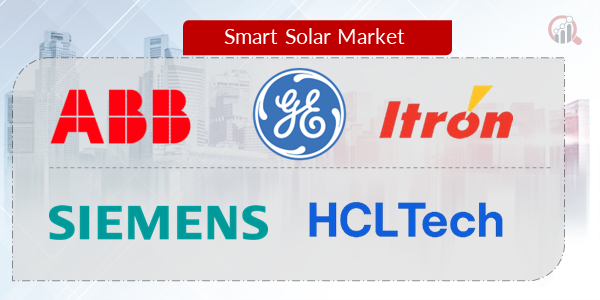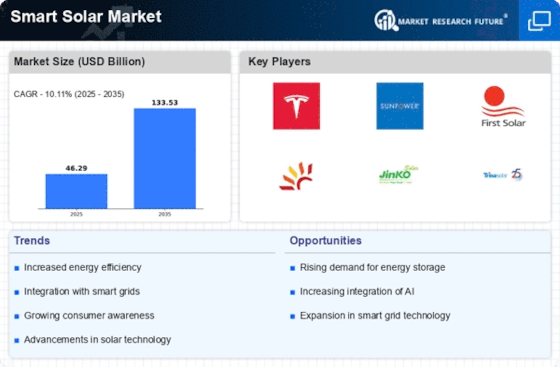Top Industry Leaders in the Smart Solar Market

*Disclaimer: List of key companies in no particular order
The smart solar market, still young but burgeoning, stands as a crucial battleground in the global energy transition. With its promise of optimized energy production, intelligent grid integration, and enhanced consumer empowerment, it attracts an increasingly diverse mix of players vying for dominance.
Key Players and Strategies:
Established Tech Giants: Siemens, ABB, and Schneider Electric wield their formidable technological prowess and broad global reach, offering comprehensive smart solar solutions encompassing inverters, energy management systems, and data analytics platforms. Their focus lies on integrating solar seamlessly into existing energy infrastructure and leveraging their customer base in traditional power sectors.
Solar Panel Manufacturers: Companies like Trinasolar and SunPower are expanding beyond panel production, developing smart inverters and microgrid solutions to capture value across the solar energy chain. Their strategy often involves strategic partnerships with established technology players to access expertise and market networks.
Energy Retailers and Utilities: Companies like Itron and Enel are leveraging their existing customer base and grid connections to offer smart solar as a service, where consumers access solar energy without upfront costs. This model democratizes solar access and fosters closer engagement with customers.
Start-ups and Niche Players: Innovative startups like Sunverge and Tesla are disrupting the market with disruptive technologies like battery storage and AI-powered energy management systems. Their agility and focus on specific segments allow them to carve out distinct niches within the evolving market.
Factors for Market Share Analysis:
Technology Portfolio: Offering a comprehensive range of smart solar solutions, from hardware to software, is crucial for capturing market share. Players with diverse offerings cater to varied customer needs and can command higher project valuations.
Geographical Footprint: A strong global presence, particularly in high-growth regions like Asia Pacific and Latin America, is essential for capturing larger market share. Regional focus and partnerships with local players can provide a competitive edge.
Cost-Competitiveness: Delivering value through competitive pricing and innovative financing models is paramount in a price-sensitive market. Players offering flexible payment options and subscription models can attract cost-conscious consumers.
Brand Recognition and Trust: Established brands with proven track records in the broader energy sector enjoy an advantage in terms of consumer trust. Leveraging existing brand equity in smart solar offerings can attract a wider customer base.
Emerging Trends and Company Strategies:
Microgrid Integration: The rise of microgrids, powered by smart solar and battery storage, presents a lucrative opportunity for players with expertise in distributed energy management. Companies are adapting their solutions to cater to this growing segment.
Artificial Intelligence and Big Data: AI-powered energy management systems are revolutionizing energy forecasting and grid optimization. Companies are investing heavily in AI and data analytics capabilities to offer smarter and more efficient solutions.
Cybersecurity: As smart solar systems become increasingly interconnected, cybersecurity concerns are escalating. Players are offering secure communication protocols and data encryption solutions to address these concerns and gain customer trust.
Personalization and Customer Engagement: Providing personalized energy insights and flexible user controls is becoming essential for customer engagement. Companies are developing user-friendly dashboards and mobile apps to empower consumers and drive loyalty.
Overall Competitive Scenario:
The smart solar market is characterized by dynamic competition, with established players facing challenges from nimble startups and innovative new entrants. While technological prowess and global reach remain important, success increasingly hinges on adaptability, focus on specific market segments, and offering cost-effective, customer-centric solutions. Continued technological advancements, rising energy costs, and increasing government support for renewables are expected to propel market growth, providing ample opportunities for innovative players to carve out their space in this rapidly evolving landscape.
Industry Developments and Latest Updates:
ABB (Switzerland):
- Dec 22, 2023: ABB and Hyundai Motor Group partner to develop charging infrastructure for electric vehicles and energy storage solutions for smart grids. (Source: ABB Press Release)
Itron Inc. (U.S.):
- Dec 19, 2023: Itron partners with Landis+Gyr to provide smart metering solutions for the modernization of grid infrastructure in Southeast Asia. (Source: Itron Press Release)
Aeris (U.S.):
- Dec 15, 2023: Aeris collaborates with Shell to deliver cellular IoT connectivity for monitoring and managing remote solar assets. (Source: Aeris Press Release)
Solnet Group (Netherlands):
- Dec 05, 2023: Solnet acquires Dutch solar developer GroenLeven to expand its renewable energy portfolio in Europe. (Source: Solnet Press Release)
Solar Data Systems, Inc. (U.S.):
- Dec 12, 2023: Solar Data Systems secures a contract with a major utility company to deploy its PV monitoring and data analytics platform across its solar portfolio. (Source: Solar Data Systems Press Release)
Aclara Technologies LLC (U.S.):
- Dec 07, 2023: Aclara partners with Schneider Electric to integrate its smart grid solutions with Schneider's grid management platform for enhanced grid visibility and control. (Source: Aclara Press Release)
General Electric (U.S.):
- Dec 27, 2023: GE Renewable Energy announces the commissioning of a 100 MW solar PV plant in India, highlighting its commitment to clean energy solutions in emerging markets. (Source: GE Renewable Energy Press Release)
Top Companies in the Smart Solar industry includes,
ABB (Switzerland)
Itron Inc. (U.S.)
Aeris (U.S.)
Solnet Group (Netherlands)
Solar Data Systems, Inc. (U.S.)
Aclara Technologies LLC (U.S.)
General Electric (U.S.)
Huawei Technologies Co., Ltd (China)
Siemens (Germany)
HCL Technologies (India)










